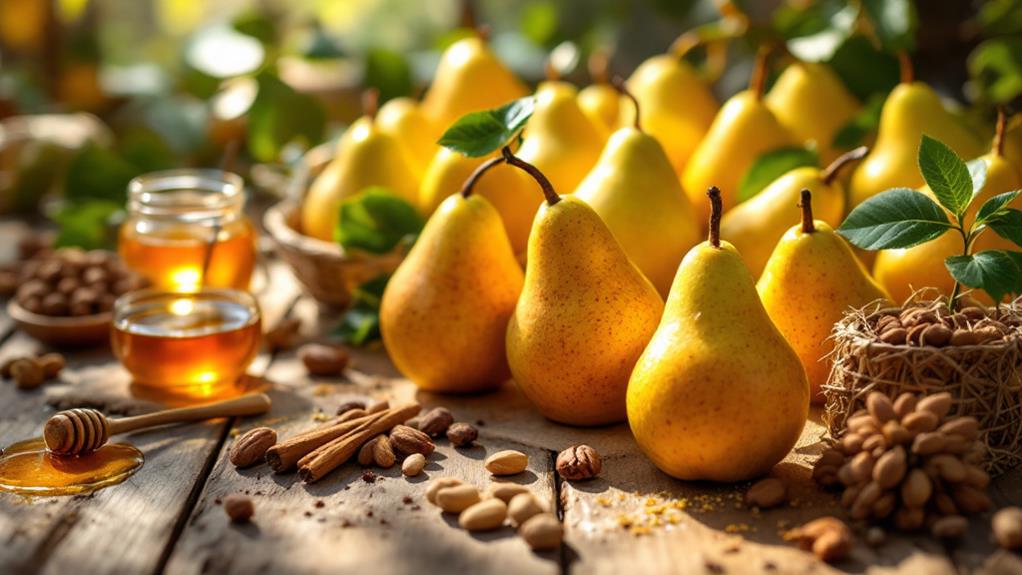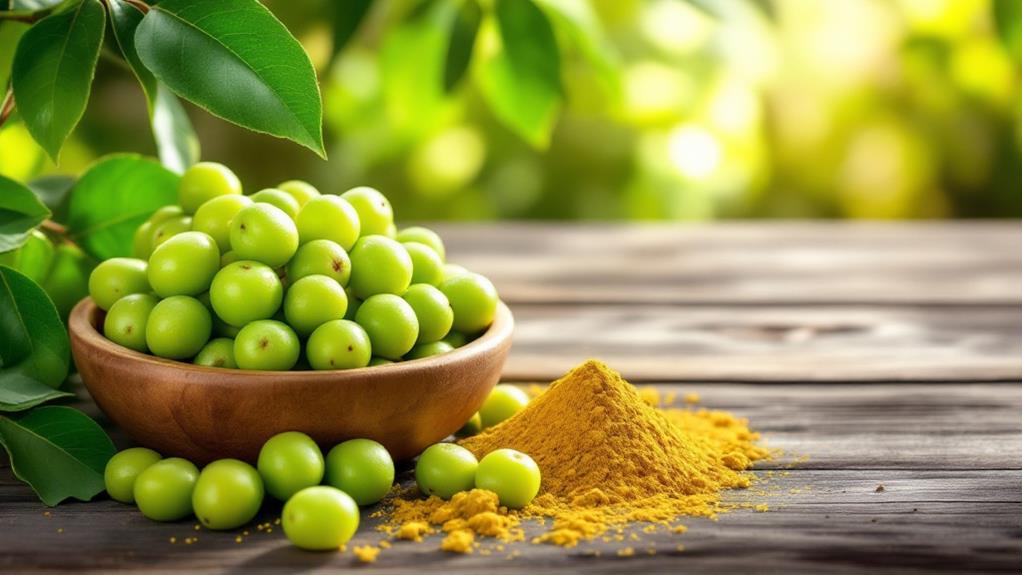The Ultimate Guide to Banana Flowers: Uses and Health Benefits
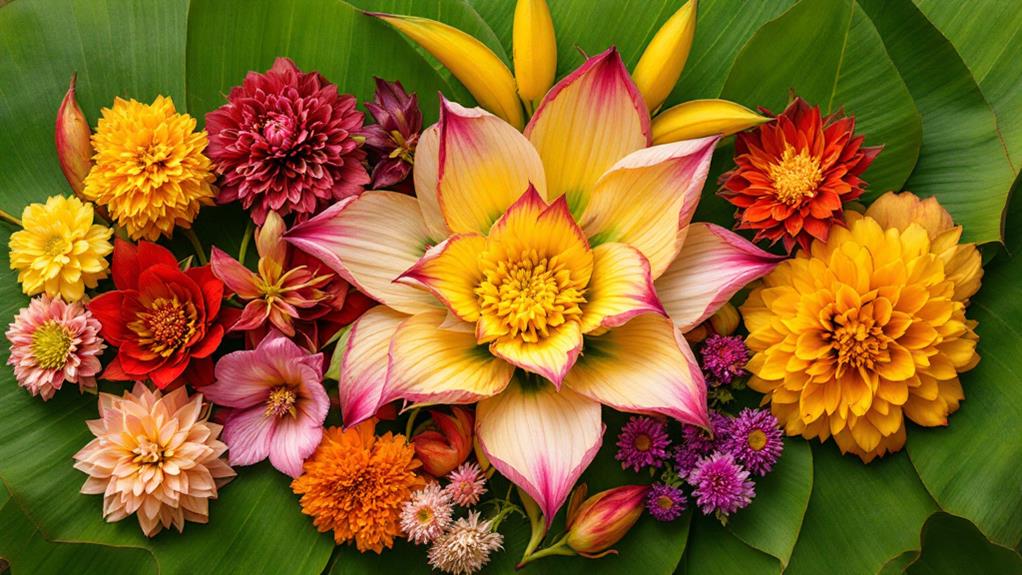
You'll find banana flowers to be a nutritious and adaptable supplement to your diet. These edible purple blooms not only improve Sri Lankan curries but work wonders in salads too, thanks to their fiber-rich content. They're low in calories and packed with crucial minerals like potassium and calcium. The high antioxidant levels can help reduce inflammation and combat oxidative stress. Plus, their potential to assist with blood sugar regulation makes them ideal for diabetes management. Before you plunge into it, remember the importance of proper preparation to avoid bitterness. There's much more to uncover about these culinary gems.
Understanding Banana Flowers
Banana flowers, often called banana blossoms or hearts, are the edible purple, tear-shaped wonders you'll find at the end of banana clusters. Packed with nutrients, these blossoms have a low calorie count of about 51 kcal per 100g, making them a great supplement to your diet. Their nutritional profile includes 1.6g protein, 0.6g fat, and 9.9g carbohydrates, but the real star here is the dietary fiber. With 5.74g of fiber per 100g, banana flowers can greatly benefit your digestive health by promoting regular bowel movements and preventing constipation.
Incorporating banana blossoms into your meals also provides you with important minerals such as potassium, calcium, and iron. These minerals play crucial roles in maintaining heart health, supporting bone strength, and enhancing general vitality. Furthermore, banana flowers are known for their potential anti-diabetic properties, helping regulate blood sugar levels. While they're a staple in Southeast Asian cuisine, often used in salads and curries, their delicate artichoke-like flavor makes them a versatile ingredient with numerous culinary applications. By understanding these health benefits, you can make informed choices about including banana flowers in your diet for improved well-being.
Culinary Applications
In countless kitchens, banana flowers have emerged as a versatile ingredient with their unique ability to complement both vegan and non-vegan dishes. As an edible flower, banana blossoms are making waves in culinary applications worldwide. Their neutral flavor and capacity to absorb seasonings make them an excellent meat substitute in vegan recipes. From hearty Sri Lankan curries to invigorating salads, banana flowers shine through with their nutritional benefits and delightful texture.
To reveal their culinary potential, start by removing the tough outer bracts to expose the tender yellow florets and white center. Soak them to reduce bitterness, enhancing their subtle artichoke-like flavor. They're perfect for both raw and cooked dishes, adding an exciting element to your meals. For a taste of Southeast Asia, try incorporating banana flowers into Sri Lankan curries, where they blend seamlessly with spices and coconut milk.
For something light yet satisfying, a Banana Blossom Salad could be your go-to. Core the flower, soak it to prevent oxidation, and toss it with ingredients like prawns and nuts. This dish not only bursts with flavor but also provides a good dose of fiber, elevating your culinary experience.
Nutritional Profile
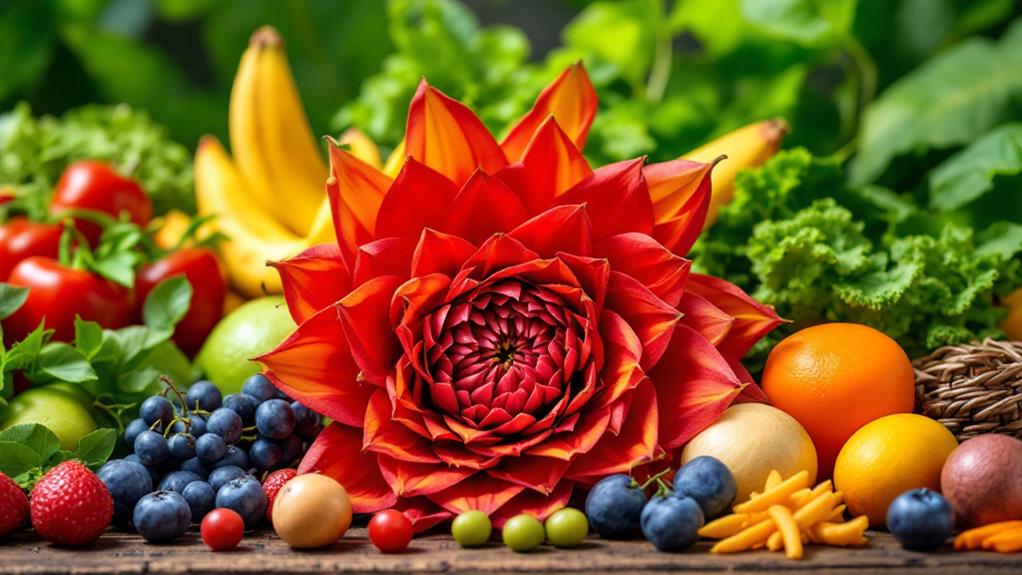
A closer look at the nutritional profile of banana flowers reveals their impressive health benefits. They're a fantastic low-calorie option, with just 51 kcal per 100g, making them perfect for weight management. Beyond their calorie count, banana flowers pack a punch with 1.6g of protein and 9.9g of carbohydrates per 100g, supporting muscle health and energy needs.
The high dietary fiber content of 5.74g per 100g helps promote digestive health and keeps you feeling full longer. Banana flowers also shine with their fundamental minerals, providing 571.33mg of potassium, 33.27mg of calcium, and 43.44mg of iron per 100g. These minerals are critical for:
- Heart health – Potassium supports cardiovascular function.
- Bone strength – Calcium is crucial for maintaining strong bones.
- Oxygen transport – Iron plays a key role in carrying oxygen through the blood.
Additionally, banana flowers boast antioxidant properties due to their vitamins A, C, and E content. These vitamins help combat oxidative stress, contributing to comprehensive health and vitality. By incorporating banana flowers into your diet, you can enjoy a nutrient-dense food that aligns with your health goals.
Health Advantages
Exploring the nutritional richness of banana flowers naturally leads to their impressive health advantages. As a rich source of antioxidants like quercetin and catechin, banana flowers help combat oxidative stress, reducing inflammation and potentially lowering the risk of chronic diseases such as cancer and heart disease. These antioxidants are essential for promoting comprehensive health and longevity.
The high fiber content of banana flowers, at 5.74g per 100g, offers significant digestive health benefits. Consuming these flowers can prevent constipation and support regular bowel movements, ensuring your digestive system functions smoothly. Furthermore, the substantial amounts of potassium and magnesium in banana flowers are important for maintaining cardiovascular health and proper muscle function, making them a heart-friendly choice.
For individuals managing diabetes, banana flowers can be beneficial. They have properties that lower blood sugar levels and improve glucose uptake, aiding in diabetes management. This makes them a valuable inclusion in a diabetic-friendly diet. Additionally, if you're breastfeeding, the galactagogue properties of banana flowers can improve lactation. They support milk production, contributing to comprehensive lactation health. Incorporating banana flowers into your diet offers these health benefits, making them a versatile and nutritious choice.
Safety Considerations
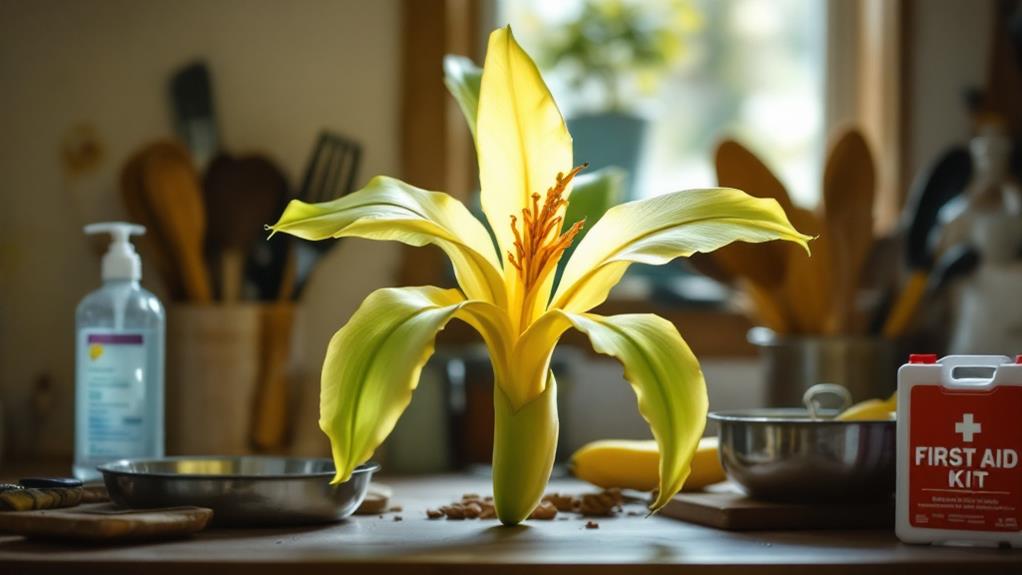
In regards to consuming banana flowers, you'll find they're generally safe and well-tolerated. However, as with any food, there are some safety considerations you should keep in mind. While banana flowers offer numerous health benefits, individuals with banana allergies need to exercise caution due to the potential for rare allergic reactions. Always prioritize safety by consulting healthcare professionals, especially if you intend to use banana flowers for medicinal purposes or if you have pre-existing health conditions.
When incorporating banana flowers into your diet, remember:
- Carefully remove the sap during preparation to prevent bitterness and possible skin irritation.
- Include them as part of a balanced diet to guarantee you're getting a wide range of nutrients.
- Be mindful of any unusual symptoms post-consumption that might indicate an allergic reaction.
Although no significant negative effects are reported in the literature, the lack of extensive human studies on the health benefits of banana flowers suggests the need for a balanced approach. Don't hesitate to seek professional advice to affirm your consumption aligns with your health needs. By doing so, you can enjoy the unique flavors and potential benefits of banana flowers safely.
Future Research Directions
While banana flowers have shown promise in diverse health-related areas, future research should investigate deeper into their potential benefits. One promising direction is examining their anticancer properties. Researchers should scrutinize how saponins and flavonoids in banana flowers can inhibit cancer cell growth. This could lead to new, natural cancer therapies. In addition, you should consider their role in managing metabolic disorders like diabetes. Studies focusing on how banana flower extracts can lower blood glucose levels could pave the way for groundbreaking functional foods.
Investigating their impact on gut health is another vital area. You should probe into how the prebiotic effects and fiber content of banana flowers support beneficial gut bacteria. This could markedly improve their nutritional benefits and total health profile. Moreover, validating their traditional medicinal uses, such as in treating respiratory issues and menstrual discomfort, could integrate these flowers more into modern medicine.



